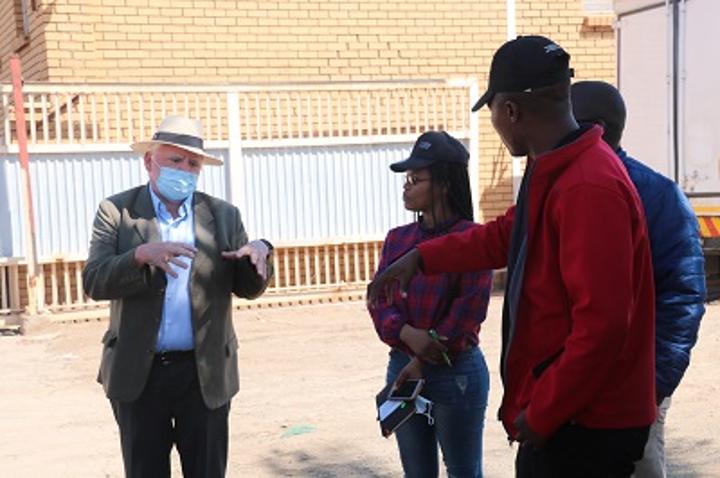Africa-Press – Lesotho. In a bid to intensify efforts towards preventing HIV and Sexually Transmitted Infections (STIs) amongst risk populations, the United Nations Populations Fund (UNFPA), in
collaboration with the Lesotho Planned Parenthood Association (LPPA) have initiated a project on preventing HIV transmission and improved access to Sexual and Reproductive health and rights information and services along
Lesotho’s three borders. The comprehensive HIV prevention project dubbed “Along the Borders, “is aimed at reducing HIV incidences and risky behaviour along three border posts, being Maseru, Maputsoe
and Van Rooyen’s Gate border posts. These are the busiest borders which are deemed highly porous and catalytic to transmission of new HIV infections, hence the
project is targeting migrants, long distance truck drivers, youth and key populations along these borders. In his dialog at the Maputsoe Wellness Centre, UNFPA Representative Lesotho Dr Marc Derveeuw explained
how the project will run, saying “it started in April, scheduled to take eight months ending in December 2020 with possibility of extension based on availability of funding.
He added that, “it has engaged peer educators whose role is to mobilise the target populations and facilitate their access to health services, link them to
a nearby health facilities and ensure that they access integrated Sexual and Reproductive Health and Rights (SRHR) and HIV services. ” He said they are also
expected to organise outreach activities for the target populations, distribute condoms in identified hot spots with clear refill plans, provide Information,
Education and Communication (IEC) materials and be advocates and champions that influence their peers to access HIV and Sexual Reproductive Health and Rights (SRHR)
services. “Amongst others, the project will provide scented and branded condoms which according to consultations held before the development of the Lesotho
National Condom Strategy, were deemed as more appealing to most sectors and the target populations in particular”, he said. In an interview with Informative
Newspaper, Derveeuw said it was his first visit since the project started rolling out at border posts with local partners, LPPA. He said from his tour, he learned that a lot still needs to be done, saying they are going to
educate peer educators more in order to strengthen them, adding that the use of posters, billboards and flyers need to be implemented as another way of passing
information. “Sustainability of the Maputsoe Wellness Centre comes with the design of the project, luckily I have extended collaborations with the Ministry of Health
(MoH)’s Principal Secretary (PS) who has taken over in running of the clinic, that guarantees a lasting service,” he said. United Nations Programme
on HIV and AIDS (UNAIDS) Country Director Jacqueline Makokha said data affordability is a big challenge for both patients and nurses whereby a nurse or even a peer educator needs to make
a follow up with a client. Makokha continued that there is also a frequent delay of information transmission. She encouraged LPPA to work with other Non-Governmental
Organisations (NGOs) likeLesotho Network of AIDS Service Organisation (LENASO) and Lesotho Network of People Living Openly with HIV and AIDS (LENEPOWA)
for she realised the high number of HIV/AIDS infections in Maputsoe. Maputsoe Wellness Clinic Senior Nursing Officer Thapelo Phomane stated that the facility started in
December 2016 and has so far, “served 102 sex workers, 96 community members including those that are provided with Pre-Exposure Prophylaxis (Prep), 25 Truck drivers, 16 Men Sleeping with other Men (MSM) and
1 lesbian.
” She furthered that the project has been prompted by results of Lesotho Populations-based HIV Impact
Assessment (LePHIA) in 2018, which have shown estimates on HIV incidences at 13,000 annually. It showed most affected populations as Female Sex Workers ranging
at 70-73.3%, MSM at 31.1-33% and migrant’s populations at 29.8-31.8%. LPPA Project Manager Theodusius Ponya said they are trying their best to reach both sex workers and
truck drivers, however he said the greatest challenge is crossing border gates due to the COVID 19 pandemic as a results it becomes difficult for them to
reach their targets since they are mainly destined at border posts. At the end of the project, it is expected that 14,876 mobile populations, youth and key populations around
the three target borders will be more knowledgeable of HIV prevention, engage in safer sexual behaviour practices and have a reduced rate of HIV infection through regular use of preventive technologies and services.
For More News And Analysis About Lesotho Follow Africa-Press






